Posts Tagged ‘Parliament’ (44 found)
The Significance of Signing the Deed of Commitment to Peace and National Reconciliation
On Union Day, February 12, 2015, the President, senior Tatmadaw officers, both speakers of the Hluttaws, political parties, and four Ethnic Armed Organizations (EAOs)—the Restoration Council of Shan State, Karen National Union, Democratic Karen Benevolent Army, and KNU/KNLA Peace Council—signed the Deed of Commitment to Peace and National Reconciliation (the “Deed”) at Naypyidaw. By signing the Deed, the President is able to demonstrate a positive image to the country and the international community that Burma’s peace process is moving forward in advance of the election later this year […]
• • •Constitutional Stalemate Sinks Hopes of Genuine Democracy and National Reconciliation
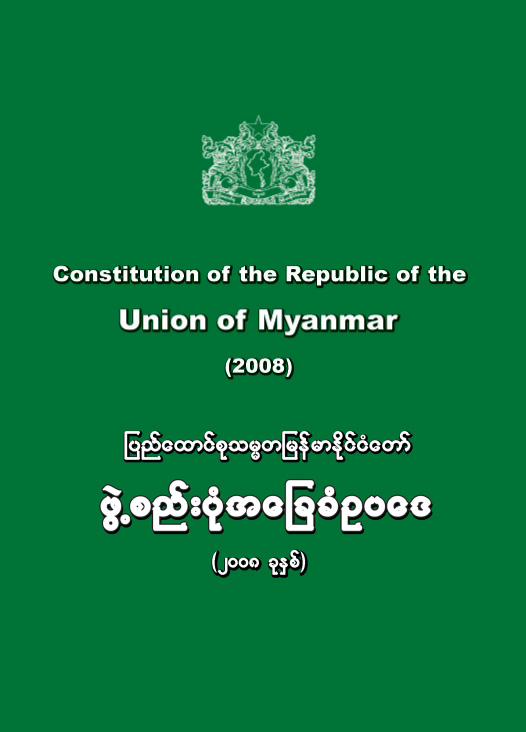 On Tuesday 18 November, Parliamentary Speaker of the lower house of the Burma Parliament Thura Shwe Mann boldly announced – to everyone’s great frustration but no one’s great surprise – that there would be no amendments made to the controversial 2008 Constitution before the 2015 national elections. So, what are the implications of this announcement, and why is the timing significant?
On Tuesday 18 November, Parliamentary Speaker of the lower house of the Burma Parliament Thura Shwe Mann boldly announced – to everyone’s great frustration but no one’s great surprise – that there would be no amendments made to the controversial 2008 Constitution before the 2015 national elections. So, what are the implications of this announcement, and why is the timing significant?
The implications for democracy in Burma are threefold. First, unless Article 59(f) is amended, Daw Aung San Suu Kyi will not be able to lead her NLD party and run for President in the 2015 elections. Although many have long feared the worst, thus far hope has persisted, especially in light of the NLD’s highly successful campaign in favor of constitutional amendment, which attracted five million signatories in support. However, Thura Shwe Mann now seems to be calling time on Daw Aung San Suu Kyi’s political career – and the dreams of so many long-suffering and long-hopeful Burmese – smoothly but ruthlessly side-lining her until such time as she can safely be labeled a political irrelevance, and dumped for good. At the same time, his comments can be interpreted as an oblique, discreet and wily announcement of his own ambitions for a tilt at the presidency next year.
Second, without a significant overhaul of the 2008 Constitution to ensure that the rights, autonomy and self-determination of ethnic minority nationalities are respected and enshrined in law, the peace process does not stand a chance. Fighting rages on in Kachin State – not to mention in northern Shan and Karen State – with no sign of abating. The day after Thura Shwe Mann made his announcement, 23 Kachin and other ethnic nationality soldiers were killed and as many as 15 wounded when Burma Army troops fired on a military training base in Laiza, the strategic headquarters of the Kachin Independence Army. […]
• • •Over 650 Myanmar/Burma Civil Society Actors Speak Out on the Reality of the Transition
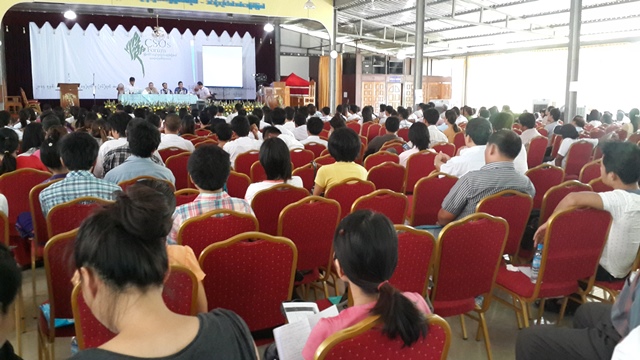 The forum titled, “Civil Societies’ Review on Myanmar/Burma’s Transition Process: Prospects for 2015 and Beyond”, held on 15 – 17 October 2014 at the Myanmar Christian Fellowship of the Blind Center in Rangoon, brought together over 650 representatives from 257 organizations and networks from across the country and border areas to discuss and strategize a wide range of key issues currently facing Burma in the context of the recent economic and political reforms since 2011. This is the first forum of this scale to assess the reform and the wide range of problems currently facing Burma.
The forum titled, “Civil Societies’ Review on Myanmar/Burma’s Transition Process: Prospects for 2015 and Beyond”, held on 15 – 17 October 2014 at the Myanmar Christian Fellowship of the Blind Center in Rangoon, brought together over 650 representatives from 257 organizations and networks from across the country and border areas to discuss and strategize a wide range of key issues currently facing Burma in the context of the recent economic and political reforms since 2011. This is the first forum of this scale to assess the reform and the wide range of problems currently facing Burma.
Despite the hailed “transition to democracy,” exalted particularly by the international community, civil society organizations (CSOs) spoke of the decades old challenges that remain unresolved, the stagnation of the reform process, and new emerging issues, in addition to the need for meaningful inclusion of the voices of civil society, democratic opposition forces, ethnic peoples, women and youth in the reform process.
The forum addressed six core issues; (1) law reform, (2) peace and conflict, (3) media, hate speech and communal violence, (4) Parliament, Government and accountability, (5) economic reform and foreign direct investment, and (6) the international community’s role and involvement, which were discussed under six panel discussions and six workshops. The forum produced a statement that gave concrete recommendations from civil society groups to the Burma Government, United Nations, international governments and international non-governmental organizations (lNGOs) […]
• • •Statement: Civil Societies’ Review on Myanmar’s Transition Process: Prospects for 2015 and Beyond
We, more than 650 representatives from 257 organizations and networks in Myanmar, came together in Yangon for 3 days from 14-16 October 2014 to exchange opinions, debate and to assess a wide range of issues currently confronting Myanmar in the context of recent political developments and the transition process that started in 2011 […]
• • •Backlash Grows Against Burma’s National Education Bill
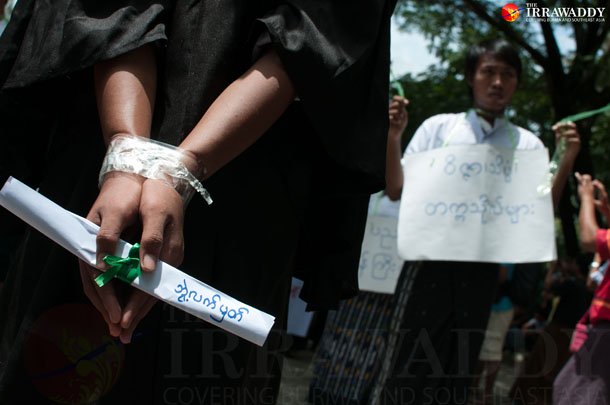 RANGOON — More than 200 civil society organizations have joined a national network of education organizations and a growing chorus of voices in rejecting a draft National Education Bill that looks likely to soon pass into law.
RANGOON — More than 200 civil society organizations have joined a national network of education organizations and a growing chorus of voices in rejecting a draft National Education Bill that looks likely to soon pass into law.
The National Network for Education Reform (NNER), which came out against the bill after it was passed by Parliament in late July, was joined this week by a diverse coalition of groups opposing the legislation because they say it violates “human rights standards.” […]
• •Teachers’ and Students’ Organizations Join Up to Oppose Education Bill
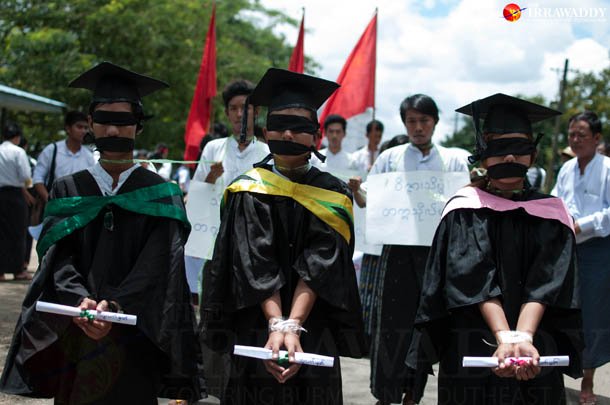 RANGOON — The Myanmar Teachers’ Federation (MTF) said it plans to cooperate with students’ organizations and join their protests against the National Education Bill if the proposed legislation is not revised in Parliament in the coming weeks.
RANGOON — The Myanmar Teachers’ Federation (MTF) said it plans to cooperate with students’ organizations and join their protests against the National Education Bill if the proposed legislation is not revised in Parliament in the coming weeks.
The MTF also called on authorities to stop their criminal investigations into recent, unauthorized student protests against the bill […]
• •Sagaing Students Protest Controversial Education Bill
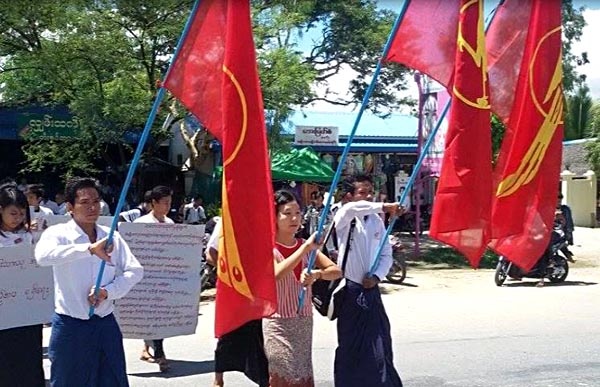 Burmese university students stood their ground and protested on Monday against the controversial draft of the National Education Bill, which was approved by the Union Parliament on 30 July.
Burmese university students stood their ground and protested on Monday against the controversial draft of the National Education Bill, which was approved by the Union Parliament on 30 July.
More than 30 students from the Sagaing Art and Science University, Technical University and Cooperative University participated in the rally, which was allowed to proceed without intervention by local authorities […]
• •
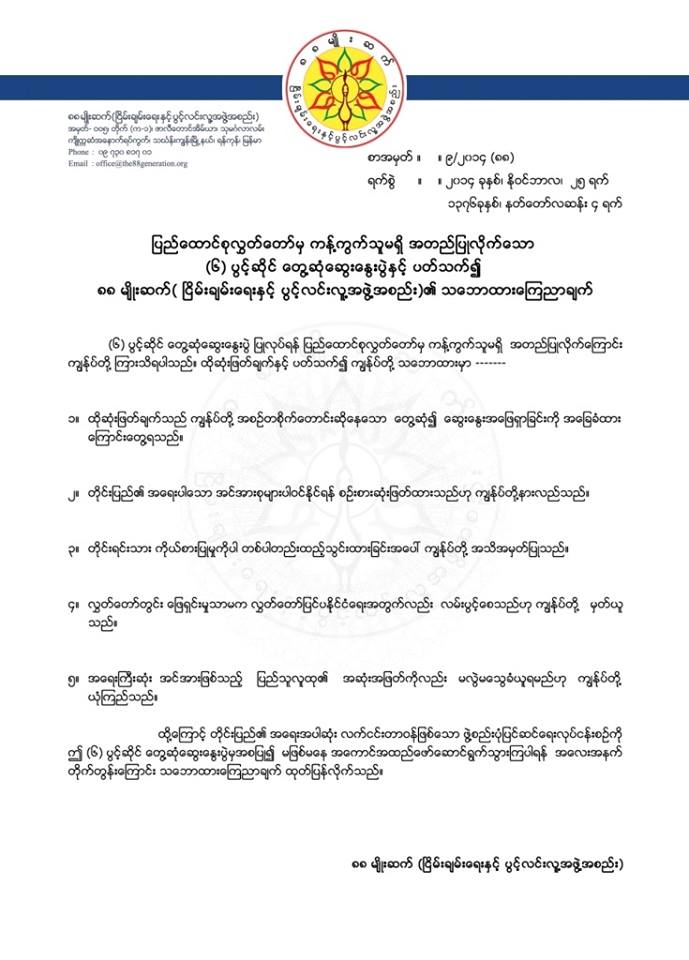
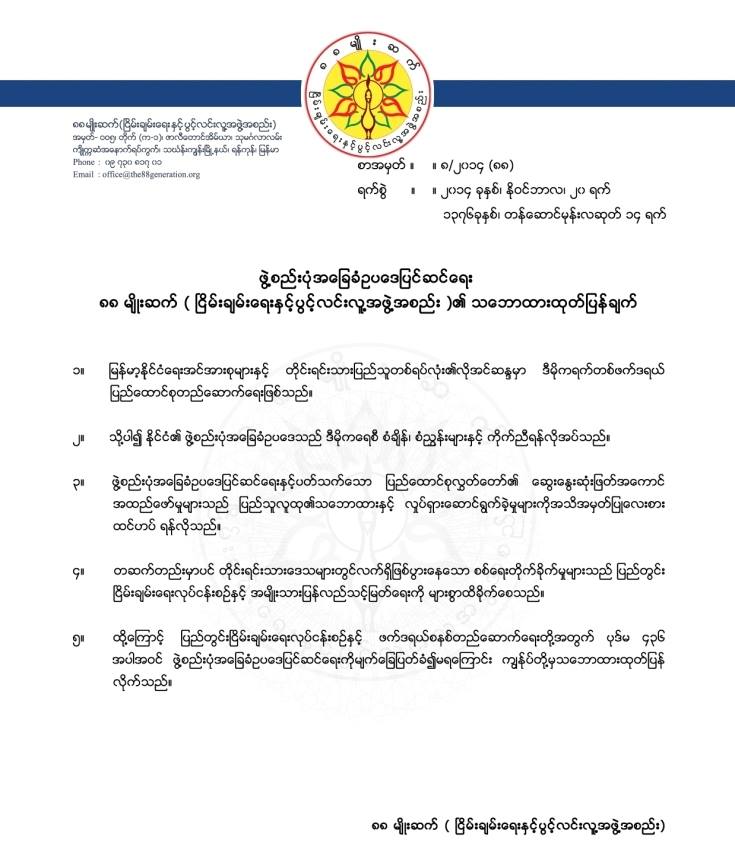











 All posts
All posts